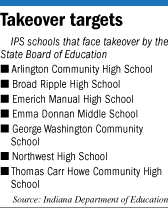Subscriber Benefit
As a subscriber you can listen to articles at work, in the car, or while you work out. Subscribe NowThe Indiana Department of Education is paying more than $680,000 to The MindTrust to develop other ways to oversee troubled schools than the traditional elected school board.
The goal of the work is to make sure none of the failing schools the state is poised to take over this year—seven of which are in Indianapolis Public Schools—gets returned to the hands of a school board that will lead it back to failure again.
 As early as next month, the state Department of Education will recommend which of 18 failing public schools should be removed from district control and given to private school operators to attempt a turnaround. Some struggling schools will be left in the hands of local school districts, but still put under closer scrutiny to improve performance.
As early as next month, the state Department of Education will recommend which of 18 failing public schools should be removed from district control and given to private school operators to attempt a turnaround. Some struggling schools will be left in the hands of local school districts, but still put under closer scrutiny to improve performance.
The students at all 18 of these schools have scored on standardization tests in the lowest category for five straight years. Under a 1999 law, the state can take over the schools if test scores are in the lowest category for a sixth consecutive year.
The money from the state, which covers from August 2010 until November 2011, expanded a project Indianapolis-based MindTrust already had under way to study alternatives for IPS.
That earlier work already has contributed to recent calls for mayoral control of IPS, an issue that has become a point of debate in this year’s election battle between Republican Mayor Greg Ballard and his Democratic challenger, Melina Kennedy.
David Harris, CEO of The MindTrust, would not comment on whether his group’s project related to mayoral control of IPS. But he did say the issue of alternative “governance structures” for failing public schools is critical.
“The fact that we have as many failed schools in IPS as we do reflects a larger issue in the overall system,” Harris said, adding, “The state doesn’t want to return schools to a governance structure that isn’t going to produce conditions that are optimal for success.”
MindTrust’s earlier work had relied on researchers at Brown University in Rhode Island and money from two national foundations, which Harris declined to name.
With the extra money from the state Department of Education, MindTrust expanded the scope of its project to look at alternatives for failing schools around the state.
The issue for state education leaders is that the 1999 law that authorizes takeovers of schools is silent on how or when the takeover process should end.
“The bigger question became, What happens next?” said Heather Neal, chief of staff at the Department of Education. “We don’t want to hang on to these schools forever.”
The Department of Education laid out some ideas in a bill filed during the 2011 legislative session. House Bill 1479 called for school turnarounds to last for two, 5-year terms.
If the intervention were to fail, the bill stipulated the troubled school would be returned to the control of its local school corporation. But if the turnaround were successful, the school would become its own school corporation, governed by a 7-member board appointed by the State Board of Education.
The bill died this year, but Neal said the state plans to file a similar bill for next year’s session. The report from the MindTrust, due at the end of November, will help inform next year’s bill.
“We will use that report to jumpstart the conversation,” Neal said, adding, “This is a substantial investment for us, I would say. This work for us is so critical to the success of the turnaround effort.”
But the entire effort irks Elizabeth Gore, president of the IPS board.
“This is kind of being aggressive to be talking about taking over our school board,” she said.
Gore does not minimize the struggles at the seven IPS schools, and she acknowledges that IPS has had many years to turn them around. But she argues IPS has been making progress on several fronts—most notably improvements at Broad Ripple High School and at the K-8 level—and should be given more time with its other struggling schools.
“All we’re asking for is more time and the funds,” Gore said. “We need the money. Maybe the state can spend that $680,000 on helping IPS.”•
Please enable JavaScript to view this content.
